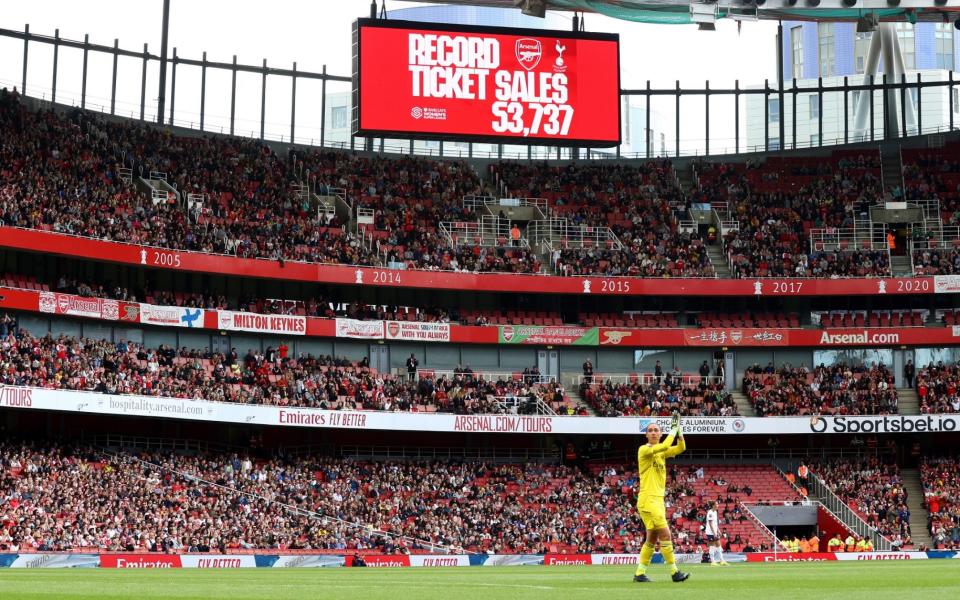
When Arsenal took the decision last May that, regardless of how well England performed at the Euros, they were going to play a minimum of six matches at the Emirates Stadium in the 2022-23 season, many eyebrows were raised.
But now that the 60,704-capacity venue has sold out for Sunday’s Women’s Champions League semi-final second leg against Wolfsburg, there will be envious eyes at rival clubs, many asking how Arsenal have achieved the feat.
There have been many contributing factors, from active involvement of the board, right through to the fightback to earn a 2-2 draw in the first leg, but an early decision to significantly increase their marketing resources was arguably the biggest.
For one thing, it meant they were promoting tickets for their home game against Tottenham Hotspur from the moment England beat Germany at Wembley. Within seven days of England lifting the Euros trophy, Arsenal had sold 16,000 tickets for September’s north London derby.
Ultimately, it attracted a Women’s Super League record crowd of 47,367. But the club was also determined to learn lessons from that occasion, particularly around the demographics of the attendees.
Dozens of fans had turned up with prams, and had to be told at the turnstiles that they could not enter the stadium. Matchday messaging was tweaked and nobody turned up with a pram for November’s WSL meeting with Manchester United.
It was also found that fans were arriving significantly closer to kick-off time than for a men’s match, and a high proportion had bought an Arsenal women’s ticket for the first time.
Similarly, matchday messaging was amended, aimed at enhancing the fan experience. Arsenal decided that, rather than having a separate marketing team for their women’s matches, the whole club would work to market the games.
And Arsenal Women are not exactly a small sports team – they have 4.9 million “likes” on Facebook, 4.7 million followers on TikTok, 1.7 million on Instagram, and 615,000 on Twitter. Undeniably, though, one of the biggest appeals of a women’s ticket at the Emirates is the value.
At £1,839 for the most expensive, Arsenal have the second-most expensive adult season tickets in the Premier League. The price of today’s match tickets – £12 for adults, £6 for concessions, with “early bird” prices of £9 and £4.50 respectively prior to April 11 – will have been attractive to many.
That said, the “club level” seats (£35) sold out first, seven days ago, and there has been no giveaway of tickets. Yet, while ticket prices for men’s and women’s matches vary enormously, the buy-in from senior executives does not.
Chief executive Vinai Venkatesham – who said in November that his ambition was for the women’s team to play all of their matches at the Emirates – and board members Josh Kroenke, Tim Lewis and Lord Harris of Peckham were all at the game in Wolfsburg last Sunday, while sporting director Edu and men’s team manager Mikel Arteta attended the quarter-final against Bayern Munich.
“Exciting’ doesn’t do it justice,” said defender Lotte Wubben-Moy, when asked about the sell-out. “A lot of hard work has gone into this. When you look at the future sustainability in the game for Arsenal Women as a club, that’s what is most exciting for me.
I hope every Gooner there will be screaming their hearts out.” Head coach Jonas Eidevall said: “For me, this has always been the natural progression that we were going to get here [selling out], whether it was this game or not. I hope when we look back on the day, in history, that we can see that was a starting point – to make this a regular occurrence.”